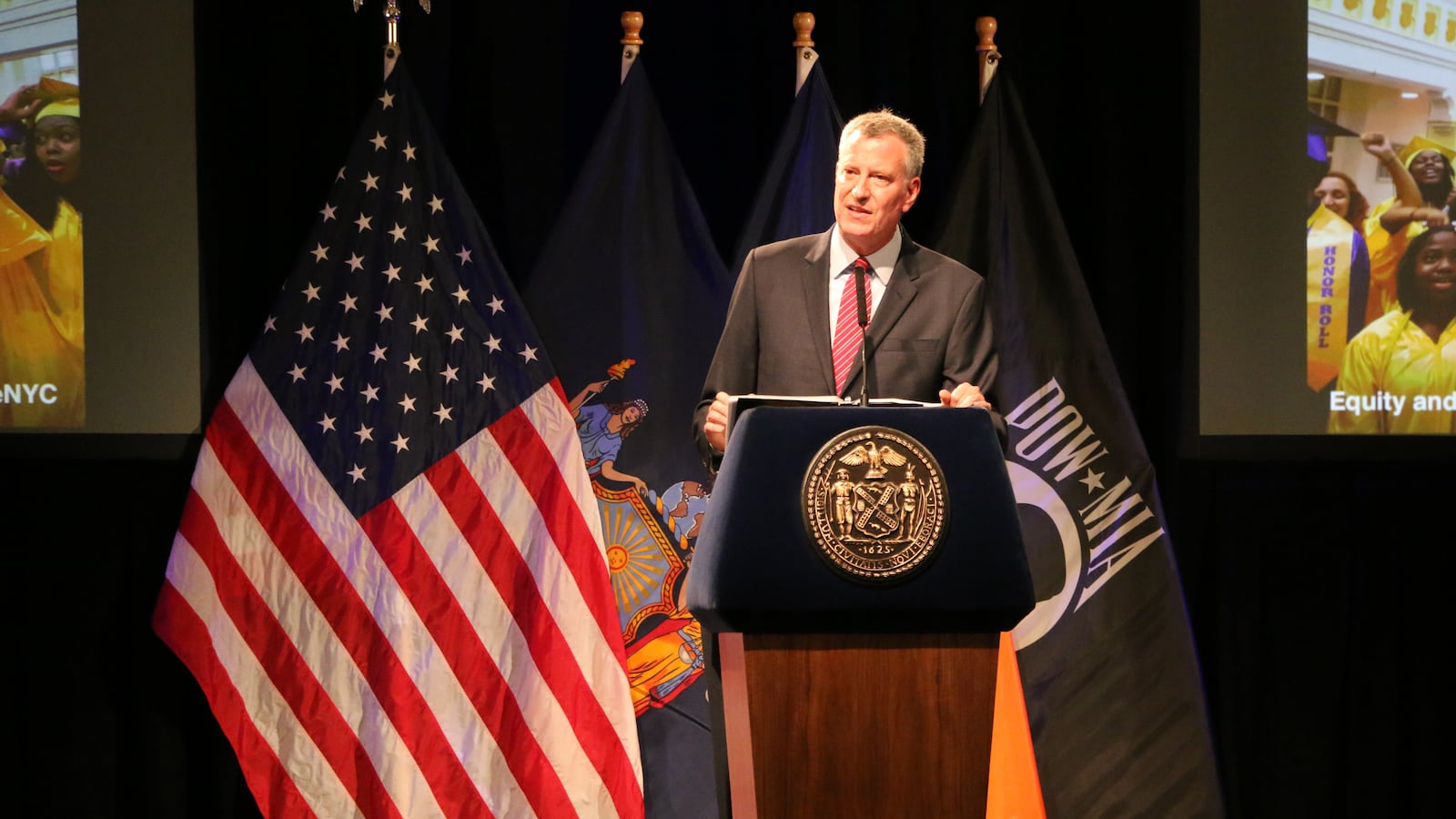Mayor Bill de Blasio laid out an ambitious new set of education goals and initiatives on Wednesday.
In a speech at Bronx Latin, de Blasio said the city would aim for 80 percent of high-school students to graduate within four years and would add reading specialists to elementary schools to ensure all second-graders could read at grade level. Over the next decade, the city will also introduce computer science instruction to all schools and offer all eighth-grade students the chance to take algebra.
After the de Blasio administration spent most of its first year and a half focused on rapidly expanding pre-kindergarten and introducing plans to improve a set of especially low-performing schools, the mayor’s speech offered new indications about how the city plans to improve instruction in all schools. De Blasio said the changes are aimed at creating a more equitable school system and city, invoking his mayoral campaign’s focus on inequality.
“There is a tale of two cities in our schools,” de Blasio said. “Excellence will not be apportioned out for the lucky few.”
We’ll be adding details over the course of the day. Here’s what the mayor announced:
Graduation rate goal: The city’s four-year August graduation rate was 68 percent for the class of 2014. De Blasio set a new goal: 80 percent by 2026, 10 years after this year’s high school seniors graduate.
College readiness: Two-thirds of those graduates will be “college ready” by the city’s standards by 2026, de Blasio said. That number refers to graduates who scored 80 or higher on a Regents math exam and 75 or higher on the English Regents exam or earned an equivalent score on the SAT, ACT, or CUNY Achievement Test, which included 47 percent of the city’s 2014 graduates.
In the South Bronx’s District 7 and Brooklyn’s District 23, adult advocates called “single shepherds” will be paired with students to help them navigate middle and high school and to prepare for college, starting next fall at a cost of $15 million per year.
Another initiative will provide tours of New York City colleges to middle-school students. De Blasio mentioned Columbia, New York University, the City University of New York, and the Fashion Institute of Technology specifically.
Advanced Placement classes: The mayor said the city will expand access to Advanced Placement courses. Some new AP classes and prep classes will be rolled out by next fall, the mayor said. Seventy-five percent of students will be offered at least five AP classes by the fall of 2018 and all high schools will have that many by 2021.
Officials did not say which AP courses would be made more widely available. A recent report from the Center for New York City Affairs at the New School found that nearly four in 10 city high schools do not offer advanced math and science classes. The reasons include the proliferation of small high schools, which have less scheduling flexibility, and that many high school students are unprepared for the material — two challenges the de Blasio administration is likely to face as it expands access to AP courses.
Algebra instruction: The city will expand middle-school algebra classes to ensure students take the class by ninth grade. More than 40 percent of middle schools currently don’t offer algebra in eighth grade, according to the city.
Some new algebra classes will be added next fall, and all students will have access to algebra in eighth grade by 2021.
Computer science: All students will receive some computer science education in elementary, middle and high school in the next 10 years. The number of students receiving computer science training will be “expanded significantly” starting in the fall of 2016, and the program will have expanded to all grades in 2025. The program is expected to cost $81 million and will be the nation’s largest effort to increase computer science in classrooms, de Blasio said.
It expands on a series of smaller efforts to boost computer science in schools that the city has made over the last few years, including the launch of a teacher training plan, opening software engineering-focused high schools, and adding Advanced Placement computer science courses to high schools.
Reading instruction: Elementary schools will have access to expert reading specialists, who will focus on helping all students read on grade level by second grade. That’s a goal Chancellor Fariña has been talking about since the start of last school year.
De Blasio said his goal is for two-thirds of students to be able to read with fluency by the end of second grade within six years, and for the city to achieve 100 percent literacy in second grade by 2026. That will require significant improvements: Less than one-third of New York City’s third-graders earned a proficient score on last year’s state tests.
Approximately 700 reading specialists will be placed in elementary schools by 2018 and schools that need the “most support” will begin hiring specialists this spring.
District-charter school cooperation: De Blasio said the city would create and fund at least 25 partnerships between district and charter schools to share ideas for teaching math and reaching English language learners. The initiative will be based on Chancellor Carmen Fariña’s “Learning Partners” program and cost $5 million a year by 2017.
Correction: An earlier version of this story referred to a different college readiness measure.

